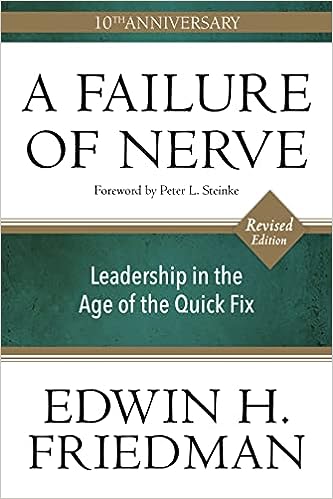
Leadership: wisdom of Edwin Friedman
About ten years ago, I took the advice of an Episcopalian priest and read Edwin Friedman’s A Failure of Nerve: Leadership in the Age of the Quick Fix; I was so intrigued by the content of this book that I bought several copies and sent them to friends. Recently, I have re-read the book and once again been astounded anew by the rare insight of this man, so very relevant to these troubled, turbulent times.
Family therapist and ordained Rabbi Edwin Friedman died suddenly in 1996 prior to the completion of this book; it was his family and friends whom we can thank for publishing this remarkable work of wisdom that will stop you in your tracks if you take the time to read and ponder it.
In the forward to his book, Friedman credits author Gilbert Murray’s book on Greek Religion with his title. In a chapter called “Failure of Nerve,” Murray contends that the rapid rise and even more rapid decline of the Greek civilization was due to a failure of nerve required to replace one set of superstitions myths- the Greek gods dethroned by Socrates- with a new set of beliefs. In prose reminiscent of the Gospel, Murray states that “…there is always an infinite supply of superstitions available to the mind that desires such things, that is the mind that has not trained itself to the hard discipline of reasonableness and honesty, will, as soon as those devils are cast out, proceed to fill itself with their relations.”
Friedman uses strong language here
as when he claims that there exists in America a leadership toxic climate where those individuals who try to ‘stand tall amid the anxiety storms of our time’ are actively ‘sabotaged’ or when he uses the analogy of terrorism as a perfect metaphor for the pathology running amuk in 21st century America.
This is a challenging book where the author does not aim to comfort but to challenge; one where he opines that the very characteristics required in our leaders: clarity and decisiveness, are thwarted at every level and in every institution whether governmental or religious, educational or corporate. Written over twenty years ago, these words are all too real to us when we consider recent political quagmires we witness in primaries, debates and our political candidates; what Friedman does however, is to bring it all a lot closer: Our very own church, work place and our very own families.
The theory used by Friedman emanates from his years in family counseling, governmental consultation and as a Rabbi in synagogues. I am not trained in family therapy and have never functioned as a religious leader therefore some of his vocabulary is new to me. The thrust of this book however, with its focus on emotional maturity, self-control, personal responsibility are like a drink of cool water on a very hot day to my psyche. Friedman uses ‘cultural camouflage ‘ to describe what I know of as an era where conciliation, obsequiousness and risk avoidance are rewarded and where irresponsible even disruptive behavior is tolerated even encouraged. Cultural camouflage says it much more efficiently.
I wish dearly that this book would be mandatory reading for anyone in a leadership position, for all parents, for all leaders of churches and all parishioners; in short, for all of us whether teacher or student.



